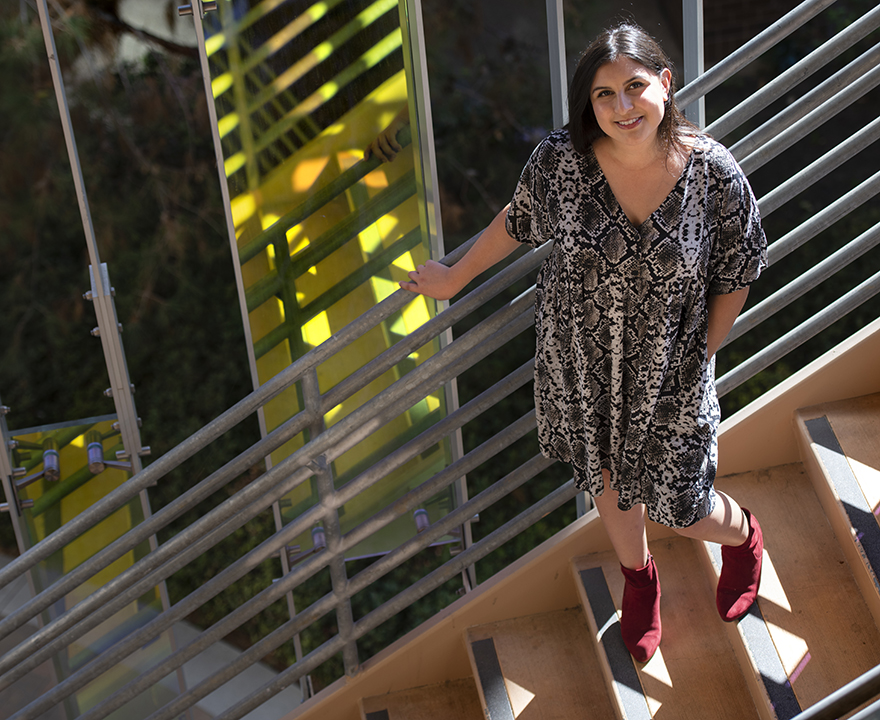From art to anthropology

From art to anthropology
- November 20, 2019
- By following her passions, anthropology Ph.D. student Leah Sanchez finds her academic niche
Leah Sanchez is a digital anthropologist who studies how intellectual property laws affect the creativity and livelihoods of artists who sell their work online. It’s an important area that deals with a growing global problem, and it appeals to Sanchez’s academic and artistic interests.
Now a third-year Ph.D. student at UCI, she discovered her love of anthropology as a first-generation college student at Long Beach City College in 2010. “At the time, I was a literal starving artist squirreling away the meager income I earned from selling landscape paintings to offset the costs of my tuition,” Sanchez says. “I felt adrift academically.”
She was supplementing her general education requirements with art and foreign language classes but found herself wondering about the reasons behind a lot of things: Why do people use language the way they do? Why are students taught to paint portraits the same way? And why do individuals form online communities when they cannot see each other face to face?
Anthropology, Sanchez was excited to learn when she took a course, answered those questions and encouraged her to pursue others, such as how traditions and perspectives shift across different cultures.
“By the time I transferred to Cal State Dominguez Hills, I was completely enraptured by the field and knew I wanted to take my passions further,” she says. “I loved being a student, but I also wanted to be on the forefront of new discoveries. I wanted to contribute to the production of anthropological knowledge.”
In 2015, Sanchez, a McNair Scholar at CSUDH, began working on an ethnographic research project about virtual worlds. “It required a lot of reading,” she says. “And, it turned out, so many of these great pieces on the subject were written by UCI faculty. So when it came time to apply to grad school, UCI seemed like a perfect fit.”
Although Sanchez had offers from other universities, she says, “UCI was very proactive in helping me secure various sources of funding.” She received the Nevin Graduate Endowment Fellowship, designed to facilitate the recruitment of the best and brightest Ph.D. and M.F.A. students to UCI. It supplements the financial aid package she was awarded.
“Overall, I chose UCI because it best fits my research interests, the social environment within the department and on campus was very positive, and the impressive financial support would allow me to focus on refining my research skills,” Sanchez says.
Hoping to follow in their footsteps, Sanchez is especially appreciative of UCI anthropology professors Tom Boellstorff and Angela Jenks, who, she says, have been instrumental in shaping her writing and teaching abilities. Beyond a career in academia, Sanchez plans to emulate their strong, encouraging mentorship.
“I have no doubt that Leah will be an outstanding teacher,” Jenks says. “She combines academic expertise with an inventive and engaging approach to course design and a clear sensitivity to the needs of students. I’ve been inspired by the materials she created in my Teaching Anthropology course, and I’ve adopted several of her approaches.”
Sanchez is looking forward to the future. “Now I’m funded to do the research I love,” she says, “and I feel inspired to make my anthropological contribution.”
Publicly launched on Oct. 4, 2019, the Brilliant Future campaign aims to raise awareness and support for UCI. By engaging 75,000 alumni and garnering $2 billion in philanthropic investment, UCI seeks to reach new heights of excellence in student success, health and wellness, research and more. The School of Social Sciences plays a vital role in the success of the campaign. Learn more by visiting http://www.socsci.uci.edu.
-Christine Catlett, UC Irvine
-photo by Steve Zylius/UCI
Share on:

